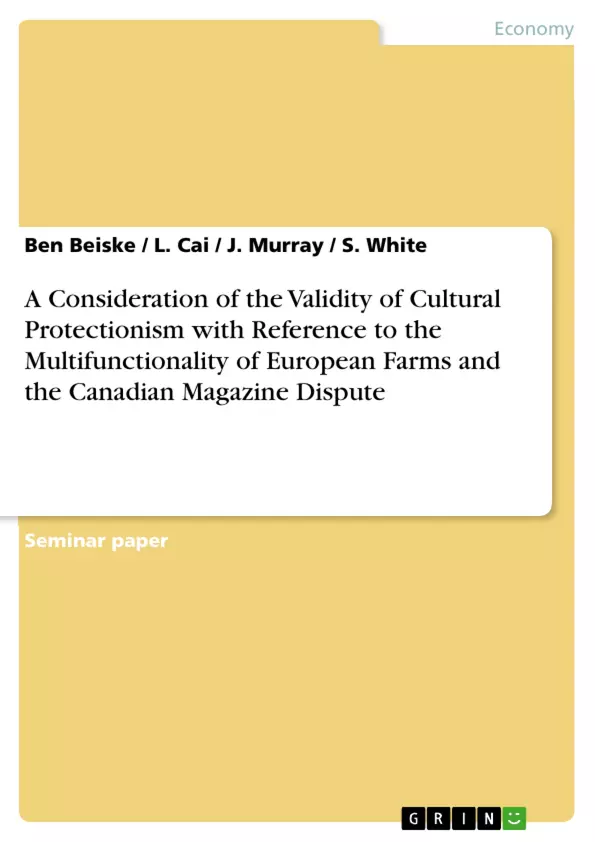This paper adresses how the defence of local culture is becoming an increasing concern in the current era of globalisation, as diminishing transport costs and new forms of communication are enabling worldwide dissemination of products and ideas. The import of cultural goods from nations with disparate values and traditions is investigated, which could potentially cause the destabilisation of national or local communities. Indeed, these cultural goods may displace existing products and result in cultural homogenisation.
Also, this paper looks at measures designed to protect culture which are exempt from WTO consideration and disputes between nations are negotiated bilaterally. As a result, fears that larger economies, such as the US, are able to dominate the cultural industries of smaller nations are investigated.
Finally, this paper makes two main recommendations concerning domestic policy and concerning international trade policy. Through the development of a methodology which can develop agreements on more easily recognisable cultural interests - those less clouded by economic motivations - such a body would be able to tackle the more complex and problematic issues, with the aim of separating economic and political issues from genuine cultural concerns.
Table of Contents
- EXECUTIVE SUMMARY
- INTRODUCTION
- PROTECTIONISM
- NEW VS. OLD PROTECTIONISM
- JUSTIFYING PROTECTIONISM
- CULTURAL PROTECTIONISM
- INTERNATIONAL TRADE POLICY AND CULTURAL PROTECTIONISM
- CULTURAL PROTECTIONISM POLICY IN THE CONTEXT OF CRITICAL DEBATE
- CASE STUDY I: THE MULTIFUNCTIONALITY OF EUROPEAN FARMERS
- THE POSITION OF EUROPEAN FARMERS
- THE VALIDITY OF EUROPEAN FARMING SUBSIDIES
- CONCLUSION: MULTIFUNCTIONALITY OF EUROPEAN FARMERS
- CASE STUDY II: THE CANADIAN MAGAZINE DISPUTE
- THE EMERGENCE OF THE CANADIAN MAGAZINE DISPUTE
- NATIONAL OR INTERNATIONAL POLICY MATTER?
- CONCLUSION: CANADIAN MAGAZINE DISPUTE
- CONCLUSION AND RECOMMENDATIONS
- RECOMMENDATIONS
Objectives and Key Themes
This paper examines the validity of cultural protectionism, a growing concern in an era of globalization. The authors analyze the potential threats posed by cultural goods from nations with different values and traditions, including the destabilization of local communities and cultural homogenization. The paper explores the difficulties in defining "culture" and its link to trade policy, highlighting the potential for cultural protectionism to be used for economic protectionist agendas.
- The impact of globalization on national and local culture
- The role of government intervention in protecting cultural interests
- The validity of cultural protectionist measures in international trade
- The potential for cultural protectionism to be used for economic protectionism
- The challenges of defining "culture" in the context of trade policy
Chapter Summaries
The paper begins by exploring the theory behind economic protectionism and the value of cultural diversity. It then examines the cultural concerns arising from globalization and their implications for government trade policy.
The first case study delves into the multifunctionality of European farms, arguing that their continued existence is essential for preserving local culture and way of life. The authors analyze the justification for protectionist measures to safeguard this industry in the face of trade liberalization.
The second case study focuses on the Canadian magazine dispute, where the Canadian government implemented protectionist measures to counter competition from the US magazine industry. The authors assess the validity of these measures, considering the arguments that they were motivated by economic interests and thus illegal under WTO rules.
Keywords
Key concepts explored in this paper include cultural protectionism, globalization, trade policy, multifunctionality, economic protectionism, cultural diversity, and the World Trade Organization (WTO). The paper also examines specific cases such as the multifunctionality of European farms and the Canadian magazine dispute.
Frequently Asked Questions
What is cultural protectionism?
Cultural protectionism refers to government policies designed to protect domestic culture from the perceived negative effects of globalization and foreign cultural imports.
Why are European farming subsidies considered cultural protectionism?
The concept of "multifunctionality" argues that farms provide more than food; they preserve rural landscapes, traditions, and a specific way of life that is central to national identity.
What was the Canadian magazine dispute about?
Canada implemented taxes and postal subsidies to protect its domestic magazine industry from US "split-run" magazines, leading to a major trade dispute at the WTO.
Does globalization lead to cultural homogenization?
The paper investigates fears that dominant economies (like the US) might displace local cultural products, potentially leading to a uniform global culture.
How should trade policy handle cultural goods?
The authors recommend developing methodologies to separate genuine cultural concerns from purely economic protectionist interests in international agreements.
- Citar trabajo
- Ben Beiske (Autor), L. Cai (Autor), J. Murray (Autor), S. White (Autor), 2002, A Consideration of the Validity of Cultural Protectionism with Reference to the Multifunctionality of European Farms and the Canadian Magazine Dispute, Múnich, GRIN Verlag, https://www.grin.com/document/15452



